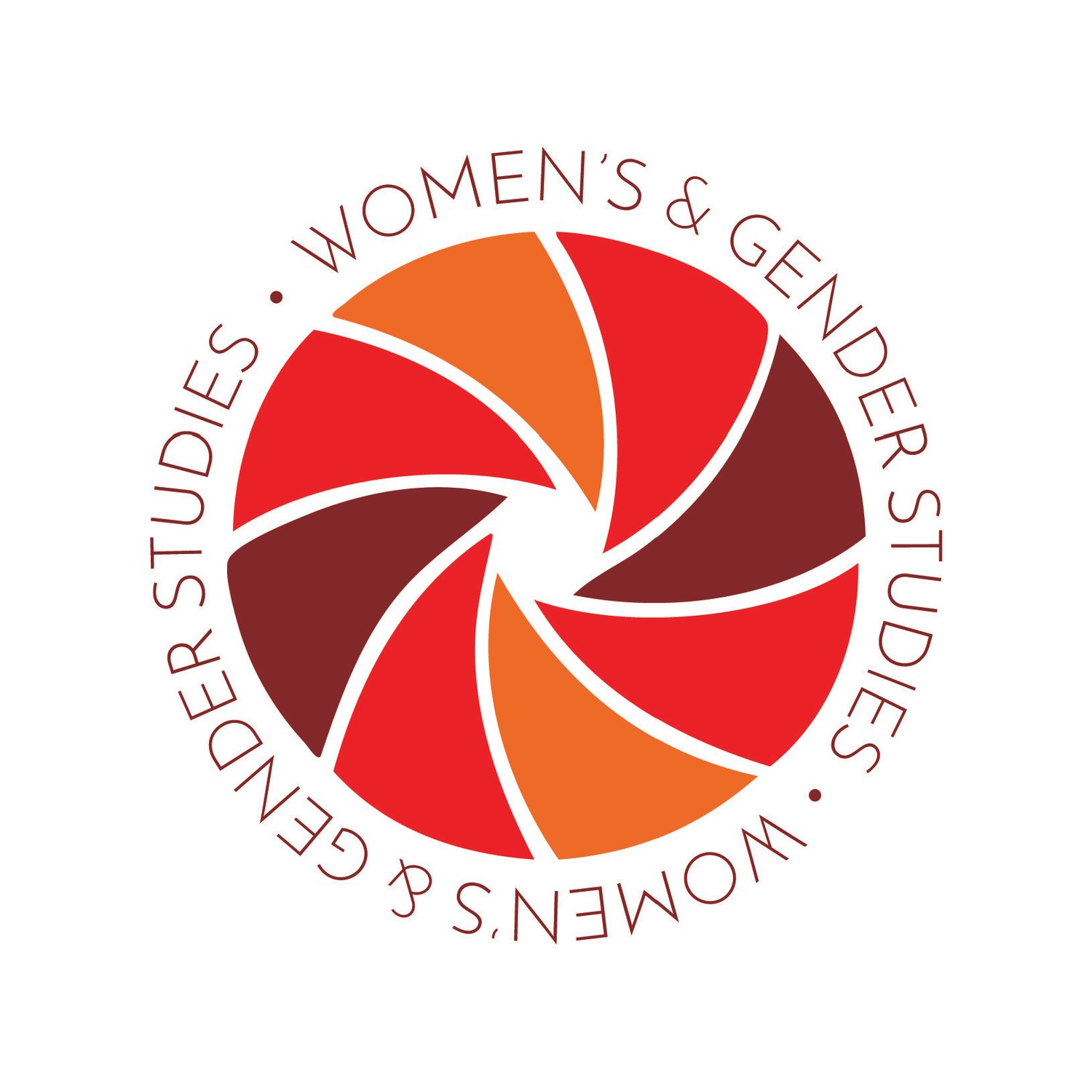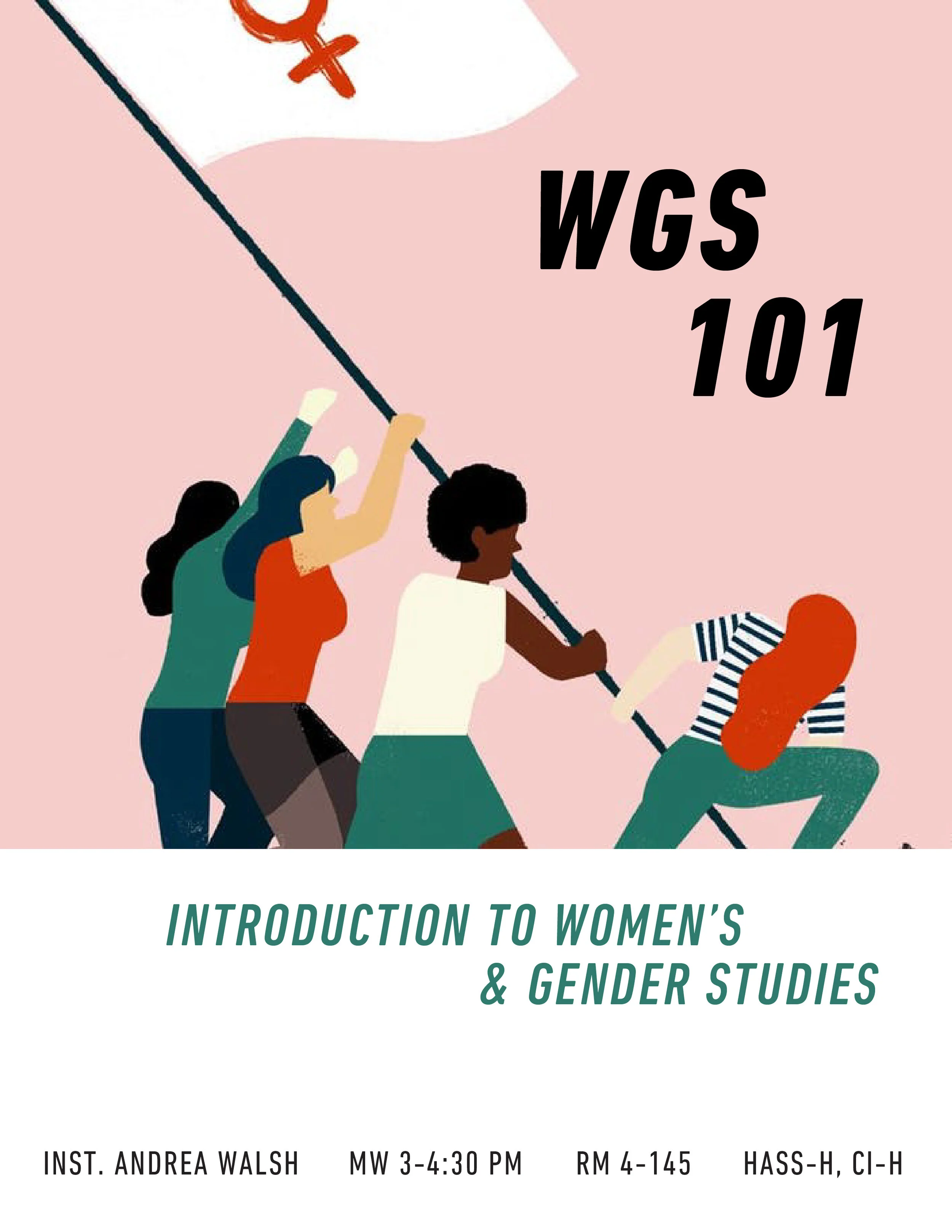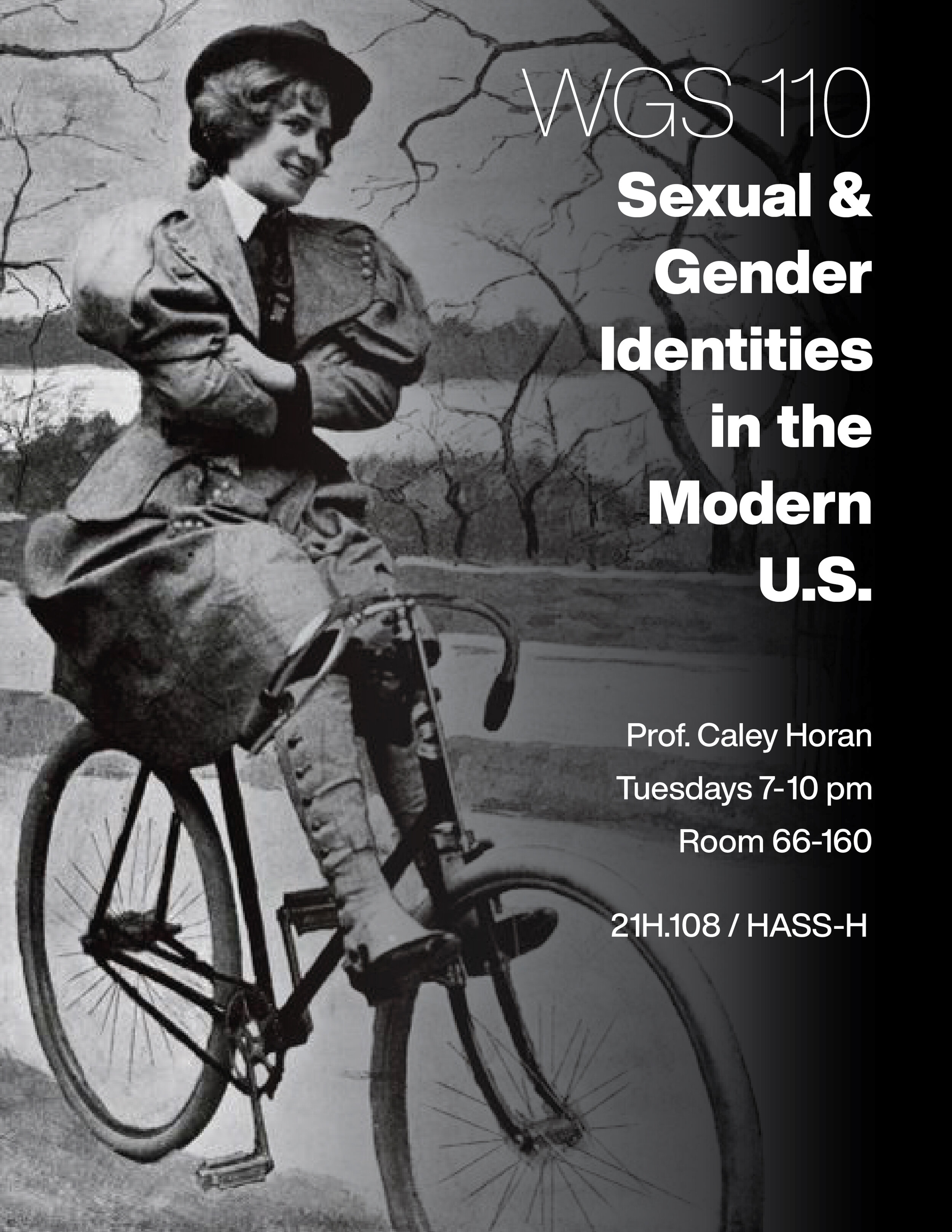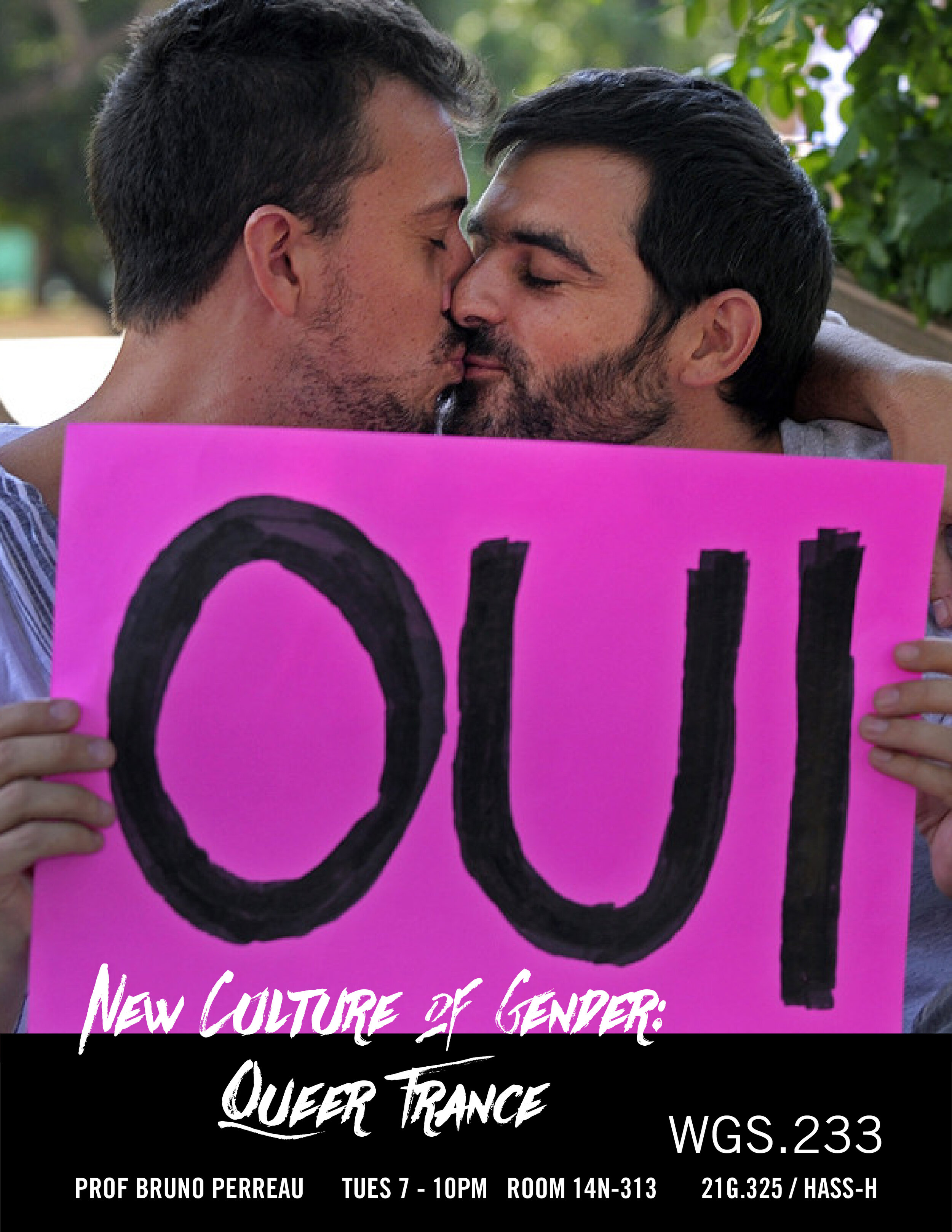AY 2021-2022
Fall 2021
New class!
Considers the ethical implications of new technologies and their impact on how we receive and transmit various types of data: medical, genetic, financial, personal. Data is being generated in many ways from our physical bodies, and this form of “datafication” has far-reaching ethical implications, particularly for historically marginalized and/or oppressed bodies, which are often subject to sexual objectification, surveillance, and other forms of control.
K.Surkan
Drawing on multiple disciplines - such as literature, history, economics, psychology, philosophy, political science, anthropology, media studies and the arts - to examine cultural assumptions about sex, gender, and sexuality. Integrates analysis of current events through student presentations, aiming to increase awareness of contemporary and historical experiences of women, and of the ways sex and gender interact with race, class, nationality, and other social identities. Students are introduced to recent scholarship on gender and its implications for traditional disciplines.
A. Walsh
Provides an introduction to the history of gender, sex, and sexuality in the modern United States, from the end of the 19th century to the present. Surveys historical approaches to the field, emphasizing the changing nature of sexual and gender identities over time. Traces attempts to control, construct, and contain sexual and gender identities. Examines the efforts of those who worked to resist, reject, and reform institutionalized heterosexuality and mainstream configurations of gendered power.
C.Horan
Examines representations of race, gender, and sexual identity in the media. Considers issues of authorship, spectatorship, and the ways in which various media (film, television, print journalism, advertising) enable, facilitate, and challenge these social constructions in society. Studies the impact of new media and digital media through analysis of gendered and racialized language and embodiment online in blogs and vlogs, avatars, and in the construction of cyberidentities. Provides introduction to feminist approaches to media studies by drawing from work in feminist film theory, cultural studies, gender and politics, and cyberfeminism.
K. Surkan
Examines the social, cultural, economic, and political aspects of digital games. Topics include the culture of gameplay, gaming styles, communities, spectatorship and performance, gender and race within digital gaming, and the politics and economics of production processes, including co-creation and intellectual property. Students taking graduate version complete additional readings and assignments.
T. L. Taylor
Examines the cultural paradoxes of contemporary globalization. Studies the cultural, artistic, social and political impact of globalization across international borders. Students analyze contending definitions of globalization and principal agents of change, and why some of them engender backlash; identify the agents, costs and benefits of global networks; and explore how world citizens preserve cultural specificity. Case studies on global health, human trafficking and labor migration illuminate the shaping influence of contemporary globalization on gender, race, ethnicity, and class. Develops cultural literacy through analysis of fiction and film. Enrollment limited.
M. Resnick
Examines the role scientists have played as activists in social movements in the US following World War II. Themes include scientific responsibility and social justice, the motivation of individual scientists, strategies for organizing, the significance of race and gender, and scientists' impact within social movements. Case studies include atmospheric testing of nuclear weapons and the nuclear freeze campaign, climate science and environmental justice, the civil rights movement, Vietnam War protests, the March 4 movement at MIT, and concerns about genetic engineering, gender equality, intersectional feminism, and student activism at MIT.
E. Bertschinger
Provides an overview of key issues and themes in the study of women and gender relations in the Middle East and North Africa. Includes readings from a variety of disciplines, e.g., history, anthropology, sociology, literature, religious studies, and media studies. Addresses themes such as the relationship between the concepts of nation and gender; women's citizenship; Middle Eastern women's activism and the involvement of their Western "sisters" to this movement; gendered interpretations of the Qur'an and the example of the Prophet Muhammad; and the three H's of Orientalism (hijab, harem, and hamam).
L. Ekmekçioğlu
Examines women's experiences during and after war and genocide, covering the first half of the 20th century in Europe and the Middle East. Addresses ways in which women's wartime suffering has been used to further a variety of political and social agendas. Discussions focus on a different topic each week, such as sexual violence, women survivors, female perpetrators of genocide, nurses, children of genocidal rape, and the memory of war.
L. Ekmekcioglu
Examines the role of science and medicine in the origins and evolution of the concepts of race, sex, and gender from the 17th century to the present. Focus on how biological, anthropological, and medical concepts intersect with social, cultural, and political ideas about racial, sexual, and gender difference in the US and globally. Approach is historical and comparative across disciplines emphasizing the different modes of explanation and use of evidence in each field.
A. Sur
Examines evidence (and lack thereof) regarding when and how an individual's thoughts, feelings, and actions are affected by sex and gender. Using a biopsychosocial model, reviews the following topics: gender identity development across the lifespan, implicit and explicit bias, achievement, stereotypes, physical and mental health, sexuality, interpersonal relationships, work, and violence. Limited to 20.
C. Kapungu
Addresses the place of contemporary queer identities in French discourse. Discusses the new generation of queer authors and their principal concerns. Introduces students to the main classical references of queer subcultures, from Proust and Vivien to Hocquenghem and Wittig. Examines current debates on post-colonial and globalized queer identities through essays, songs, movies, and novels. Authors include Didier Eribon, Anne Garréta, Abdellah Taïa, Anne Scott, and Nina Bouraoui.
Taught in French.
B. Perreau
Examines cultural responses to HIV/AIDS in the US during the first fifteen years of the epidemic, prior to the advent of highly active antiretroviral therapy. Students consider how sexuality, race, gender, class, and geography shaped the experience of HIV/AIDS and the cultural production surrounding it, as well as the legacy of this cultural production as it pertains to the communities most at risk today. Materials include mainstream press coverage, film, theater, television, popular music, comic books, literature, and visual art.
J. Terrones
J. Terrones
Examines computers anthropologically, as artifacts revealing the social orders and cultural practices that create them. Students read classic texts in computer science along with cultural analyses of computing history and contemporary configurations. Explores the history of automata, automation and capitalist manufacturing; cybernetics and WWII operations research; artificial intelligence and gendered subjectivity; robots, cyborgs, and artificial life; creation and commoditization of the personal computer; the growth of the Internet as a military, academic, and commercial project; hackers and gamers; technobodies and virtual sociality. Emphasis is placed on how ideas about gender and other social differences shape labor practices, models of cognition, hacking culture, and social media.
H. Beltrán
Explores gender roles, illuminates the power dynamics and root causes of inequality, and provides a framework for understanding gender dynamics. Develops skills to conduct a gender analysis and integrate gender-sensitive strategies into large- and small-scale development solutions. Prompts critical discussion about social, economic, and political conditions that shape gender in development. Begins with exploration of international development in the post-colonial era, using a gender lens, then provides students with the tools to integrate gender-sensitive strategies into international development work, with a particular focus on launching, building and scaling women's ventures. Opportunities may be available for international fieldwork over IAP. Students taking graduate version complete additional assignments. Limited to 12; must attend first class session.
E. McDonald, S. Haslanger
Black feminist health science studies is a critical intervention into a number of intersecting arenas of scholarship and activism, including feminist health studies, contemporary medical curriculum reform conversations and feminist technoscience studies. We argue towards a theory of Black feminist health science studies that builds on social justice science, which has as its focus the health and well-being of marginalized groups. Students will engage Black feminist health science theories that range from explorations of the linguistic metaphors of the immune system, the medicalization of race, to critiques of the sexual binary. We will use contemporary as well as historical moments to investigate the evolution of “scientific truth” and its impact on the U.S. cultural landscape.
M. Bailey
Drawing on multiple disciplines - such as literature, history, economics, psychology, philosophy, political science, anthropology, media studies and the arts - to examine cultural assumptions about sex, gender, and sexuality. Integrates analysis of current events through student presentations, aiming to increase awareness of contemporary and historical experiences of women, and of the ways sex and gender interact with race, class, nationality, and other social identities. Students are introduced to recent scholarship on gender and its implications for traditional disciplines.
A. Walsh
Spring 2022
Draws on different disciplines, conceptual frameworks, and methodological approaches to examine gender in relation to health, including public health practice, epidemiologic research, health policy, and clinical application. Discusses a variety of health-related issues that illustrate global, international, domestic, and historical perspectives. Considers other social determinants of health as well, including social class and race. Limited to 25.
B. Charlton
Analyzes mainstream, popular films produced in the post-WWII 20th century US as cultural texts that shed light on ongoing historical struggles over gender identity and appropriate sexual behaviors. Traces the history of LGBTQ/queer film through the 20th and into the 21st century. Examines the effect of the Hollywood Production Code and censorship of sexual themes and content, and the subsequent subversion of queer cultural production in embedded codes and metaphors. Also considers the significance of these films as artifacts and examples of various aspects of queer theory.
K. Surkan
Drawing on multiple disciplines - such as literature, history, economics, psychology, philosophy, political science, anthropology, media studies and the arts - to examine cultural assumptions about sex, gender, and sexuality. Integrates analysis of current events through student presentations, aiming to increase awareness of contemporary and historical experiences of women, and of the ways sex and gender interact with race, class, nationality, and other social identities. Students are introduced to recent scholarship on gender and its implications for traditional disciplines.
A. Walsh
Cookbooks can tell us how to bake a really good chocolate cake, but what is it we find when we read between the lines? Not only sources of recipes, cookbooks are also windows into the worlds that produced them, revealing what foods were available (and to whom), what technologies were used, who cooked (and for whom), and what food meant to the people who produced, transported, processed, cooked, and ate it. In this class, we will give the same care and attention to American cookbooks and food blogs that are often given more traditional forms of writing. We will focus on women’s contributions because historically it was through domestic manuals, recipes, and cookery books that women expressed themselves. Even today, with so many avenues open to them, women continue to dominate both cookbook publishing and the culinary blogosphere.
Ina Lipkowitz
Provides an introduction to the analysis of gender in science, technology, and environmental politics from a global perspective. Familiarizes students with central objects, questions, and methods in the field. Examines existent critiques of the racial, sexual and environmental politics at stake in techno-scientific cultures. Draws on material from popular culture, media, fiction, film, and ethnography. Addressing specific examples from across the globe, students also explore different approaches to build more livable environments that promote social justice. Taught in English. Limited to 18.
B. Stoetzer
Explores gender and race through interdisciplinary perspectives from film and visual studies, art history, and performance studies. Provides an overview of methodologies and practices, with an emphasis on contemporary artists working across mediums. Contextualizes artistic output within broader systems of power and cultural institutions. Reflects on the politics of visibility, hypervisibility, and invisibility through an intersectional feminist approach that draws on perspectives from trans*, queer, feminist, dis/ability, and critical race theory. Lectures are supplemented by in-class screenings, discussions, workshops, guest lectures, and field trips. Culminates in a final creative project that includes a presentation. Limited to 18.
An interdisciplinary subject that examines questions of feminism, international women's issues, and globalization through the study of novels, films, critical essays, painting and music. Considers how women redefine the notions of community and nation, how development affects their lives, and how access to the internet and to the production industry impacts women's lives. Primary topics of interest include transformations of traditional values, social change, gender role distribution, identity formation, migration flows, globalization and development, popular culture, urban life, cyber-culture, activism, and human rights. Limited to 25 when Writing Tutor is assigned to the class. Otherwise, limited to 18.
A. Sur
Analyzes theories of gender and politics, especially ideologies of gender and their construction; definitions of public and private spheres; gender issues in citizenship, the development of the welfare state, experiences of war and revolution, class formation, and the politics of sexuality. Graduate students are expected to pursue the subject in greater depth through reading and individual research.
S. Haslanger
Explores some of the forces and mechanisms through which stereotypes are built and perpetuated. In particular, examines stereotypes associated with Asian women in colonial, nationalist, state-authoritarian, and global/diasporic narratives about gender and power. Students read ethnography, fiction, and history, and view films to examine the politics and circumstances that create and perpetuate the representation of Asian women as dragon ladies, lotus blossoms, despotic tyrants, desexualized servants, and docile subordinates. Students are introduced to debates about Orientalism, gender, and power.
M. Buyandelger
Focuses on LGBT literature from the mid-19 century to the present, with an emphasis on fiction and poetry. In particular, analyzes how LGBT identities and their literary representations have changed over time. Covers authors such as Walt Whitman, Oscar Wilde, Virginia Woolf, James Baldwin, Audre Lorde, Cherrie Moraga, Melvin Dixon, Leslie Feinberg, and Luis Negron.
J. Terrones
Examines the biopsychosocial factors which impact racial-ethnic identity, racial and cultural socialization, and experiences of prejudice, bias, discrimination, and racial microaggressions across gender identities. Reviews topics in multicultural psychology from the lens of challenging ethnocentric biases in the field. Critically evaluates the intersection of race with other social identities (e.g., gender, sexual identity, and socioeconomic status) and how it impacts human behavior. Using a case study approach, students integrate empirical evidence from international psychosocial research on oppression in order to provide more breadth in understanding the influence of race and gender upon human behavior. Develops multicultural competency skills essential for practice in clinical and non-clinical organizational settings. Limited to 25.
C. Kapungu
Explores the politics of reproductive health care delivery in the United States, with a particular focus on how clinical care is shaped by--and, in turn, shapes--social inequality along axes of race and gender. Considers a variety of reproductive health issues from multiple perspectives, drawing on readings from the fields of history, anthropology, sociology, medicine, epidemiology, and law. Develops skills to interrogate how each field conceptualizes and values reproductive health, both explicitly and implicitly. Introduces major conceptual issues foundational to understanding the politics of reproduction. Goes on to cover topics such as the human biofemale reproductive lifecycle and social movements explicitly organized around reproductive health. Limited to 40.
E. Janiak
Interdisciplinary survey of people of African descent that draws on the overlapping approaches of history, literature, anthropology, legal studies, media studies, performance, linguistics, and creative writing. Connects the experiences of African-Americans and of other American minorities, focusing on social, political, and cultural histories, and on linguistic patterns. Includes lectures, discussions, workshops, and required field trips that involve minimal cost to students.
M. DeGraff, D. Fox Harrell, D. Wood































